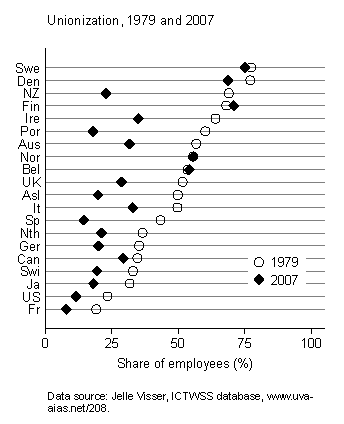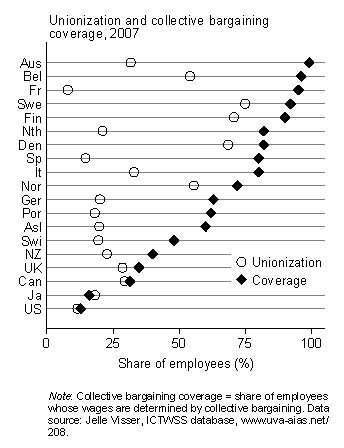by lane on April 14, 2009
When social scientists first began noticing and studying the rise in earnings and income inequality in the United States, much of the focus was on technological change. The idea is that in the past generation technology — especially computerization — has advanced more rapidly than skills, so employers have bid up pay for those able to use and improve new technology and reduced pay for (or gotten rid of) employees less adept at doing so.
Though this remains perhaps the single most popular explanation, many are skeptical. In their book The Race between Education and Technology, Claudia Goldin and Lawrence Katz offer an especially compelling critique. They suggest that the pace of skill-biased technological advance actually hasn’t changed much over the past century. What distinguishes recent decades, they contend, is that growth of educational attainment has slowed. Here’s their key picture (the vertical axis shows the share with a college degree):

[click to continue…]
by Henry Farrell on April 14, 2009
In Spring 2002, _Dissent_ published Michael Walzer’s essay, “Can There Be A Decent Left?,” which played as big a part as any piece of writing in generating the fractures among lefty intellectuals over the Iraq war. Although Walzer was later to come out in (mildly expressed) opposition to the Iraq war, he calumniated the left for its persistent failure to wake up to the reality of global terrorism.
The radical failure of the left’s response to the events of last fall raises a disturbing question: can there be a decent left in a superpower? Or more accurately, in the only superpower? Maybe the guilt produced by living in such a country and enjoying its privileges makes it impossible to sustain a decent (intelligent, responsible, morally nuanced) politics. Maybe festering resentment, ingrown anger, and self-hate are the inevitable result of the long years spent in fruitless opposition to the global reach of American power. Certainly, all those emotions were plain to see in the left’s reaction to September 11, in the failure to register the horror of the attack or to acknowledge the human pain it caused, in the schadenfreude of so many of the first responses, the barely concealed glee that the imperial state had finally gotten what it deserved. Many people on the left recovered their moral balance in the weeks that followed; there is at least the beginning of what should be a long process of self-examination. But many more have still not brought themselves to think about what really happened.
[click to continue…]
by Michael Bérubé on April 14, 2009
Yes, hogging time is here again! I never did finish <a href=https://crookedtimber.org/2007/04/25/hogging-ii-son-of-hogging/#more-5818>hockey blogging for the 2006-07 season</a>, and completely blew off blogging about the 2007-08 season, so let me start off in 2009 by predicting that the Anaheim <strike>Mighty</strike> Merely Ducks will overpower the Ottawa Senators in 2007 and that in 2008 the Detroit Red Wings and Pittsburgh Penguins will finally deliver us from the bizarre string of Stanley Cup finals involving Obscure Canadian Cities* v. Sweltering Towns in the Southern US That Weren’t Aware They Had Hockey Teams (Calgary v. Tampa Bay, Edmonton v. Carolina, Ottawa v. Anaheim). For obvious reasons, those Finals were ratings dynamite — or would have been, if they had been televised. No, wait, they <i>were</i> televised! Apparently you can watch National Hockey League games in the US by tuning to a channel called <a href=”http://www.versus.com/”>“Against,”</a> which is available on cable channel 488356 (if you get the special ultra supreme X-treme package) and which features, along with hockey, an unbeatable combination of bull riding, cage fighting, <a href=”http://www.youtube.com/watch?v=50jVa25gmWs&feature=related”>riding-mower racing, and competitive flogging</a>. So that’s positive.
Just as in 2007, veteran Calgary Flames fan Scott Lemieux will offer his take on the playoffs over at <a href=”http://lefarkins.blogspot.com/2009/04/post-youve-all-been-waiting-for.html”>Lawyers, Guns, and Money</a>, and I’ll do the honors here, where rumor has it that people have been clamoring for hockey blogging with a mighty clamor. Though I’ll put most of this under the fold, so that the three or four clamorers and I won’t disturb all the rest of you.
[click to continue…]
by John Holbo on April 14, 2009
by lane on April 14, 2009
Unionization in the United States has been declining since the 1950s, and at a particularly rapid clip since the 1970s. Many analysts who have studied the growth of income inequality in America over the past several decades agree that union decline has played a role, and some see it as the single most important factor. The Employee Free Choice Act (EFCA), which would make it easier for employees to unionize, stands a chance of becoming law in the next year or two. Would that help to reverse the rise in inequality?
I’m not optimistic. An increase in unionization would very likely help middle and low-end households to capture a larger share of economic growth. But even if EFCA is passed by Congress, I don’t expect a dramatic surge in union membership.
Yes, survey evidence suggests that many American workers who aren’t currently a union member would like some sort of organized representation. And yes, American labor law and its weak enforcement have been a key culprit in union decline. Yet other rich countries have labor law that’s much more favorable to unions, and unionization has been declining in most of them too. Consider the following figures, from the best available comparative data source. Only a few countries have avoided a sharp fall in unionization, and they’re mainly ones in which eligibility for unemployment insurance is tied to union membership.

Why the widespread decline in unionization? The causes are multiple: greater competition and profit pressure on employers, the shift from manufacturing to services, increases in part-time and temporary employment, shrinking public sectors, and attitudinal shifts across generations, among others.
How then are unions in other countries able to secure greater wage gains, and thus less inequality, than their American counterparts? The key is “extension” practices: by agreement between union and employer confederations (most nations) or due to government mandate (France), union-management wage settlements apply to many firms and workers that aren’t unionized. The following chart shows that in a number of countries the share of the workforce whose wages are determined by collective bargaining is much larger than the share of workers who are union members.

I would like to see EFCA become law. The ability of workers to bargain with management collectively rather than individually is, in my view, an important element of a just society, and these days the playing field is too heavily tilted in management’s favor. But I doubt EFCA will get us very far in reducing income inequality. Extension of union-management wage settlements would likely have a bigger impact, but at the moment that isn’t even part of the discussion.
by Chris Bertram on April 14, 2009
Martin Kelner’s utterly cynical piece in the Guardian rather sums up the attitude of metropolitan journalists. OK, so he focuses on the BBC rather than asking directly, “why don’t those mawkish Scousers shut up about their 96 dead?”, but the comparisons to Diana and Jade Goody are there for a purpose (there are some excellent comments by readers in response). Actually, I think the BBC’s coverage of the anniversary has been rather good, especially Kelly Dalglish’s fine radio programme (not mentioned by Kelner, but also featuring interviews with the parents of the Hicks sisters). There are lots of good reasons not to shut up after 20 years. Not only has there been no apology from the police for their actions, but many things haven’t changed. I was reminded of this whilst listening to the current Chief Constable of South Yorkshire explain how much the police have learnt and how it wouldn’t happen today. Oh really? Well as we know from the G20 protests (and other recent events such as the de Menezes shooting) the police still try to get their “blame the victim” story in early. They still represent themselves as helping the victim but being prevented by a hail of missiles that no-one else saw. Videotapes that might have provided evidence of police misconduct or ineptitude still disappear, or cameras “malfunction”. And the police still get to compare their notes after events involving deaths, just to make sure that their stories are consistent and supportive of the institutional stance. Yes, all good reasons not to shut up.


